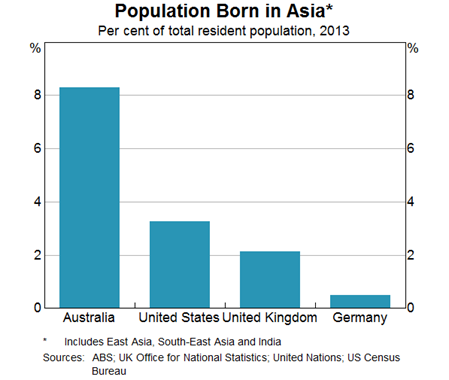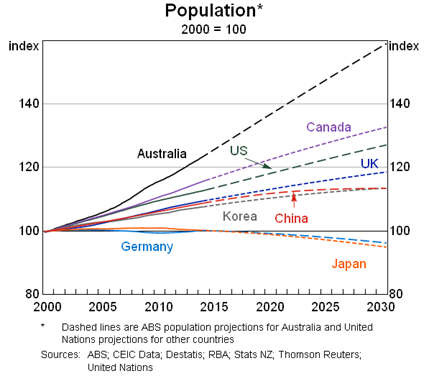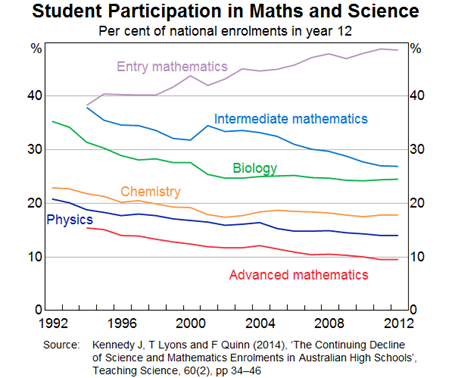The keys to ensuring Australia's economic future
Australia's once-in-a-lifetime mining boom created complacency among Australian consumers, businesses and investors. According to Reserve Bank deputy governor Philip Lowe, “retailers thought it natural that their sales grew more quickly than people's incomes”.
“Many investors thought that earning capital gains on their existing assets was the key to wealth creation.” Admittedly, many of them still do!
“Banks got used to very fast growth in their balance sheets. And we got used to the annual tax cuts that came from strong revenue growth.”
Lowe believes that we now “better appreciate the uniqueness of the earlier episode and there has been some realignment in expectations”. I think he's probably overreached there, but it is true that Australians are slowly beginning to realise that running a budget surplus is a lot harder than it used to be. In time, we'll also learn that property prices are not destined to rise in perpetuity.
That adjustment has created a number of questions: What happens to Australia after this boom is over? How can Australian businesses compete internationally? And where will the jobs come from in the future?
Lowe's speech, delivered at the Australian Business Economists Annual Dinner, discusses how our economy might look in the future. He believes that “the Australian economy does have the foundations for a successful and prosperous future” but our standards of living will “depend increasingly on investment not in physical capital, but in human capital”.
Lowe draws attention to three foundations upon which he believes Australia can build a prosperous future.
First, Australia continues to develop close linkages with Asia -- the fastest growing region in the global economy. The trade relationship is well known, exports to Asia are up by around 30 per cent over the past five years.
But Lowe is also keen to spruik the benefits of immigration and the creation of close personal relationships. Currently, around 8 per cent of the Australian population was born in east and south-east Asia or India. This is well above the proportion of the US and the UK populations that were born in Asia.
We have also exported our education system to Chinese students. Currently there are around 150,000 Chinese students enrolled at Australian educational institutions, around three times higher than in 2002.

Lowe believes these linkages are “an increasingly important national asset,” which “helps us better understand the most dynamic part of the global economy”. It allows Australians to better “identify cross-border business opportunities”.
The second foundation is Australia's strong population growth. Over the past decade, Australia has had the fastest rate of population growth in the OECD and nothing is likely to change over the next 15 to 20 years. A decade from now, it is estimated that our population will have increased by 4 million.

A bigger population does create some opportunities. Every person needs a place to work and live, for example, and there are benefits to increasing economies of scale.
But population growth represents a challenge as well. Unless Australia invests adequately in infrastructure and protects its natural resources, we run the risk of lowering the standard of living for existing Australians.
Lowe contrasts Australia's population growth with that of Japan. Over the coming decade,
Japan's population is expected to decline by about as many people as currently live in Melbourne.
I'd prefer to examine this from a different perspective and note that for much of the past fifteen years, Japan has experienced higher growth in real GDP per working-age person. The Japanese population may be declining but their standard-of-living continues to improve -- surely that's more important?
The third foundation is our considerable endowment of natural resources and this obviously ties into the mining boom. We were uniquely equipped to benefit from China's ascendency and even now, as the benefits start to diminish, resource exports and overall export income will still be much higher than it was prior to the boom.
Of course these foundations mean little if we don't make good use of them. According to Lowe, “our future is increasingly dependent upon high-level cognitive skills and our ability to understand and solve complex problems”. It requires people to be well-trained but curious, with strong interpersonal skills and a desire to approach problems in new and innovative ways.
We need to develop a culture that encourages entrepreneurialism and embraces innovation, creativity and flexibility. We also need to ensure that our labour force is appropriately trained, with the right mix of sophisticated skills to produce premium goods and services.
Lowe notes that “the share of Year 12 students studying higher level mathematics and the sciences has been in decline for many years now.” Furthermore, more young men are pursuing the hard sciences and mathematics than women. A high-wage economy will thrive or falter based on the extent to which its labour force is literate in these areas (and also increasingly in information technology).

Overall I'm not entirely sold on Lowe's three foundations but his focus on human capital is both timely and accurate. The federal government has recently taken steps to make university more exclusive and to undermine the supply of teachers and scientists. For a high-wage economy that's trying to compete internationally that's a silly approach which will almost certainly weigh on Australia's stock of human capital.
Of Lowe's three foundations, our linkages with Asia present the greatest opportunity to raise living standards. Although, I would urge policy makers to avoid becoming too dependent on one single economy.
Higher population growth is a mixed bag. It can be beneficial if managed successfully but at the moment we simply use population growth to hide the fact that living standards have stagnated. The Australian economy simply isn't producing enough jobs to warrant such a high immigration intake and rather than boosting living standards we are simply increasing Centrelink queues.
Finally, the resource sector has been hugely beneficial to the Australian economy and has shifted living standards and income higher but we really haven't made the most of the boom thus far and it's probably too late to change that. Unfortunately, we consumed most of the proceeds, with the mining boom adding very little to productive capacity in the non-mining sector.
The Australian economy can prosper over the next decade but only if we begin to embrace innovative and flexible work practices. We need to work smarter -- in other words increase labour productivity -- and that begins with increasing the quantity and improving the quality of our human capital.
















